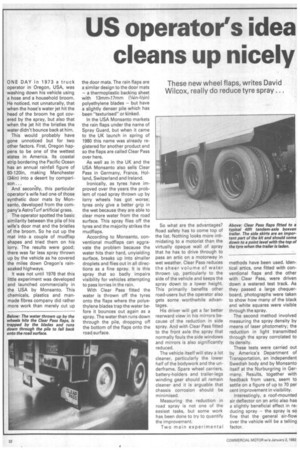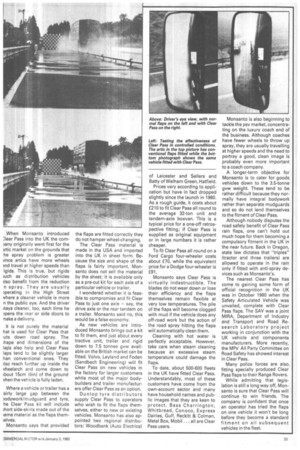US operator's idea cleans up nicely
Page 32

Page 33

If you've noticed an error in this article please click here to report it so we can fix it.
These new wheel flaps, writes David Wilcox, really do reduce tyre spray . . .
ONE DAY in 1973 a truck operator in Oregon, USA, was washing down his vehicle using a hose and a household broom. He noticed, not unnaturally, that when the hose's water jet hit the head of the broom he got covered by the spray, but also that when the jet hit the bristles the water didn't bounce back at him.
This would probably have gone unnoticed but for two other factors. First, Oregon happens to be one of the wettest states in America. Its coastal strip bordering the Pacific Ocean has an annual rainfall figure of 60-120in, making Manchester (34in) into a desert by comparison...
And secondly, this particular operator's wife had one of those synthetic door mats by Monsanto, developed from the company's AstroTurf artificial grass.
The operator spotted the basic similarity between the pile of his wife's door mat and the bristles of the broom. So he cut up the mat into a couple of mudflap shapes and tried them on his lorry. The results were good; there was far less spray thrown up by the vehicle as he covered the miles down Oregon's rainsoaked highways.
It was not until 1978 that this little experiment was developed and launched commercially in the USA by Monsanto. This chemicals, plastics and manmade fibres company did rather more work than merely cut up
the door mats. The rain flaps are a similar design to the door' mats — a thermoplastic backing sheet with 13mm:17mm (1/4in-2/3in) polyethylene blades — but have a slightly denser pile which has been "texturised" or kinked.
In the USA Monsanto markets the rain flaps under the name of Spray Guard, but when it came to the UK launch in spring of 1980 this name was already registered for another product and so the flaps are called Clear Pass over here.
As well as in the UK and the USA Monsanto also sells Clear Pass in Germany, France, Holland, Switzerland and Ireland.
Ironically, as tyres have improved over the years the problem of road spray thrown up by lorry wheels has got worse; tyres only give a better grip in the wet because they are able to clear more water from the road surface. This spray flies off the tyres and the majority strikes the mudflaps.
According to Monsanto, conventional mudflaps can aggravate the problem because the water hits their hard, unyielding surface, breaks up into smaller droplets and flies out in all directions as a fine spray. It is this spray that so badly impairs visibility for vehicles attempting to pass lorries in the rain.
With Clear Pass fitted the water is thrown off the tyres onto the flaps where the polyethylene blades trap the water before it bounces out again as a spray. The water then runs down through the pile, dropping off the bottom of the flaps onto the road surface. So what are the advantages? Road safety has to come top of the list. Nothing looks more intimidating to a motorist than the virtually opaque wall of spray that he has to drive through to pass an artic on a motorway in wet weather. Clear Pass reduces the sheer volume of water thrown up, particularly to the side of the vehicle and keeps the spray down to a lower height. This primarily benefits other road-users but the operator also gets some worthwhile advantages.
His driver will get a far better rearward view in his mirrors because of the reduction in side spray. And with Clear Pass fitted to the front axle the spray that normally fouls the side windows and mirrors is also significantly reduced.
The vehicle itself will stay a lot cleaner, particularly the lower half of the bodywork and the underframe. Spare wheel carriers, battery-holders and trailer-legs winding gear should all remain cleaner and it is arguable that chassis corrosion should be minimised.
Measuring the reduction in road spray is not one of the easiest tasks, but some work has been done to try to quantify the improvement.
Two main experimental methods have been used. Identical artics, one fitted with conventional flaps and the other with Clear Pass, were driven down a watered test track. As they passed a large chequerboard, photographs were taken to show how many of the black and white squares were visible through the spray.
The second method involved measuring the spray density by means of laser photometry; the reduction in light transmitted through the spray corrolated to its density.
These tests were carried out by America's Department of Transportation, an independent Swedish body and by Monsanto itself at the Nurburgring in Germany. Results, together with feedback from users,. seem to settle on a figure of up to 70 per cent improvement in visibility.
Interestingly, a roof-mounted air deflector on an artic also has a slightly beneficial effect in reducing spray — the spray is so fine that the general air-flow over the vehicle will be a telling factor.
When Monsanto introduced clear Pass into the UK the cornany originally originally went first for the 3rtic market on the grounds that he spray problem is greater ;ince artics have more wheels and travel at higher speeds than -igids. This is true, but rigids ;uch as distribution vehicles also benefit from the reduction n spray. They are usually operating in the High Street (where a cleaner vehicle is more n the public eye. And the driver atays cleaner, too, each time he opens the rear or side doors to nake a delivery.
It is not purely the material hat is used for Clear Pass that :uts down road spray. The :hape and dimensions of the laPs also help and Clear Pass laps tend to be slightly larger han conventional ones. They ilso reach further up inside the vheelarch and come down to ibout 15cm Gin) of the ground vhen the vehicle is fully laden.
Where a vehicle or trailer has a 'airly large gap between the oodywork/mudguard and tyre, he Clear Pass kit will include ;hort side-skirts made out of the ;ame material as the flaps them;elves.
Monsanto says that provided the flaps are fitted correctly they do not hamper wheel-changing.
The Clear Pass material is made in the USA and imported into the UK in sheet form. Because the size and shape of the flaps is fairly important, Monsanto does not sell the material by the sheet; it is available only as a pre-cut kit for each axle of a particular vehicle or trailer.
I wondered whether it is feasible to compromise and fit Clear Pass to just one axle — say, the drive axle or the rear tandem on a trailer. Monsanto said no, this would be a false economy.
As new vehicles are introduced Monsanto brings out a kit to fit them, and just about every tractive unit, trailer and rigid down to 7.5 tonnes gvw available on the British market can be fitted. Volvo, Leyland and Foden (Sandbach Engineering) will fit Clear Pass on new vehicles in the factory for larger customers while most of the major bodybuilders and trailer manufacturers offer Clear Pass as an option.
Dunlop tyre distributors supply Clear Pass to operators who wish to fit the flaps themselves, either to new or existing vehicles. Monsanto has also appointed two regional distributors; Woodbank (Auto Electrics) of Leicester and Sellers and Batty of Welham Green, Hatfield.
Prices vary according to application but have in fact dropped slightly since the launch in 1980. As a rough guide, it costs about £210 to fit Clear Pass all round to the average 32-ton unit and tandem-axle boxvan. This is a typical price for a one-off retrospective fitting; if Clear Pass is supplied as original equipment or in large numbers it is rather cheaper.
To fit Clear Pass all round on a Ford Cargo four-wheeler costs about £70, while the equivalent price for a Dodge four-wheeler is £91.
Monsanto says Clear Pass is virtually indestructible. The blades do not wear down or lose their efficiency and the flaps themselves remain flexible at very low temperatures. The pile of the flaps will become clogged with mud if the vehicle does any off-road work but the action of the road spray hitting the flaps will automatically clean them.
Cleaning with hot water is perfectly acceptable. However, take care when steam cleaning because an excessive steam temperature could damage the flaps.
To date, about 500-600 fleets in the UK have fitted Clear Pass. Understandably, most of these customers have come from the own-account sector and many have household names and public images that they are keen to protect. Bass Charrington, Whitbread, Conoco, Express Dairies, Gulf, Reckitt & Colman, Metal Box, Mobil ... all are Clear Pass users. Monsanto is also beginning to tackle the psv market, concentrating on the luxury coach end of the business. Although coaches have fewer wheels to throw up spray, they are usually travelling at higher speeds and the need to portray a good, clean image is probably even more important to a coach company.
A longer-term objective for Monsanto is to cater for goods vehicles down to the 3.5-tonne gvw weight. These tend to be rather difficult because they normally have integral bodywork rather than separate mudguards and so do not lend themselves to the fitment of Clear Pass.
Although nobody disputes the road safety benefit of Clear Pass rain flaps, one can't hold out much hope for them becoming a compulsory fitment in the UK in the near future. Back in Oregon, state law dictates that "triples" (tractor and three trailers) are allowed to operate in the rain only if fitted with anti-spray devices such as Monsanto's.
The nearest Clear Pass has come to gaining some form of official recognition in the UK was in October 1980 when the Safety Articulated Vehicle was unveiled, complete with Clear Pass flaps. The SAV was a joint MIRA, Department of Industry and Transport and Road Research Laboratory project working in conjunction with the UK vehicle and components manufacturers. More recently, the MPs' All Party Committee on Road Safety has showed interest in Clear Pass.
Many police forces are also, fitting specially produced Clear Pass flaps to their Range Rovers.
While admitting that legislation is still a long way off, Monsanto is sure that Clear Pass will continue to win friends. The company is confident that once an operator has tried the flaps on one vehicle it won't be long before they become a standard fitment on all subsequent vehicles in the fleet.














































